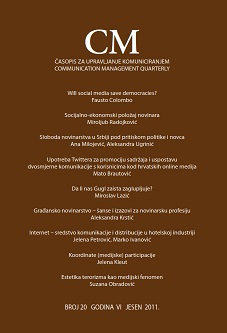Socijalno-ekonomski položaj novinara
Socio-economic Status of Journalists
Author(s): Miroljub RadojkovićSubject(s): Media studies, Social development, Social Informatics, Socio-Economic Research
Published by: Fakultet političkih nauka Univerziteta u Beogradu
Keywords: journalism profession; media transition; socio-economic position of journalists; media; privatization;
Summary/Abstract: Looking at the long term, journalists will be losers and “technological surplus” for communication practice in information society. Great deal of data collecting and disseminating will be handed over from their (and mass media) hands into hands of individual citizens and their groups. Mass communication and its mediators will be replaced by other, interactive and balanced forms of communicative practice, because of which journalists’ knowledge and skills will be less important. This trend results in global crisis of journalistic profession that can’t pass by Serbia as well. Besides, in this country there are indigenous shortcomings such as: media are technologically obsolete; inhibited by different forms of abuses in last decades; and totally unprepared for market competition into which they must enter. Additionally, media and journalists are badly hit by current global economic crisis, which makes their survival “mission impossible”. For, media transition requires the state to be eliminated as media founder (and financier), media ownership must be dual (public service plus commercial media) and information and other services should reach better quality after market competition. All these expectations have no chance to happen if economy has collapsed, if media revenue from advertising constantly diminishes, and if invisible plots among new capitalists and political elites keep some media alive by any price and lets others – following the excuse of “free market competition” – die. Our research has shown high level of exploitation of journalists in terms of work hours, income and by absence of related social taxes for health and retirement funds. Journalists do not fight against these injustices because they lack strong professional organizations and trade unions. On the other hand, average education of journalists is surprisingly high (three times higher compared to overall population), but they are apparently unprepared to work on new, digital platforms, and this weakness must be changed urgently.
Journal: CM Komunikacija i mediji
- Issue Year: 6/2011
- Issue No: 20
- Page Range: 21-39
- Page Count: 19
- Language: Serbian

